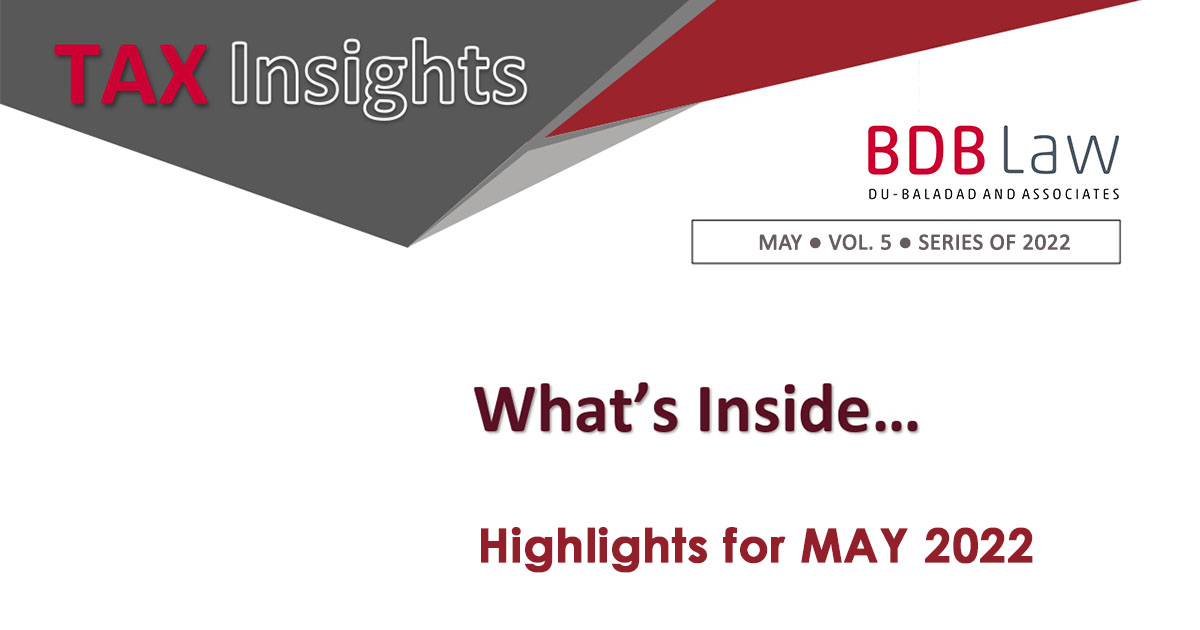


MAY • VOL. 5 • SERIES OF 2022
INSIGHTS is a monthly publication of BDB LAW to inform, update and provide perspectives to our clients and readers on significant tax-related court decisions and regulatory issuances (includes BIR, SEC, BSP, and various government agencies).
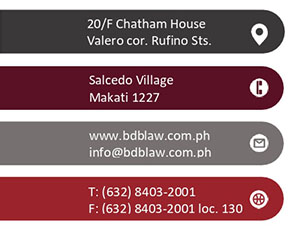
DISCLAIMER: The contents of this Insights are summaries of selected issuances from various government agencies, Court decisions, and articles written by our experts. They are intended for guidance only and as such should not be regarded as a substitute for professional advice.
Copyright © 2022 by Du-Baladad and Associates (BDB Law). All rights reserved. No part of this issue covered by this copyright may be produced and/or used in any form or by any means – graphic, electronic, and mechanical without the written permission of the publisher.
What's Inside ...
- HIGHLIGHTS FOR MAY 2022
- SIGNIFICANT COURT DECISIONS
- Supreme Court
- Court of Tax Appeals
- SIGNIFICANT REGULATORY ISSUANCES
- Bureau of Internal Revenue
- Securities and Exchange Commission
- Bangko Sentral Ng Pilipinas
- Insurance Commission
- Department of Finance
- Fiscal Incentives Review Board
- Bureau of Customs
- PUBLISHED ARTICLE
- BIR'S POWER TO ORDER CLOSURE OF BUSINESS
- OUR EXPERTS
- The Personalities
- The Personalities


HIGHLIGHTS for MAY 2022
SUPREME COURT DECISIONS
- The window period from December 10, 2003 to October 6, 2010 on the exception to the 120+30 day period on claiming VAT refund applies even if the taxpayer did not actually invoke BIR Ruling No. DA-489-03 (Harte-Hanks Philippines, Inc. v. Commissioner of Internal Revenue, G.R. No. 205189, [March 7, 2022])
- The exemption given under Section 32(B)(7)(a) cannot be stretched to Title V on Other Percentage Taxes. (IFC Capitalization (Equity) Fund, L.P. v. Commissioner of Internal Revenue, G.R. No. 256973, November 15, 2021)
- The CIR is authorized to distribute, apportion, or allocate gross income or deductions if they determine that such distribution, apportionment, or allocation: (a) is necessary in order to prevent evasion of taxes; or (b) clearly to reflect the income of organizations, trades, or businesses. (Department of Finance v. Asia United Bank, G.R. Nos. 240163 & 240168-69, December 1, 2021)
COURT OF TAX APPEALS DECISIONS
- If the provider and recipient of the 'other services' are both doing business in the Philippines, the payment of foreign currency is irrelevant. (Amadeus Marketing Philippines, Inc. v. Commissioner of Internal Revenue, CTA Case No. 10094, April 4, 2022)
- Reciprocity in tax exemption means that the international air carrier's country of registry also exempts from similar taxes the gross revenue (derived from the carriage of persons and their excess baggage) by Philippine carriers in their country. (Commissioner of Internal Revenue v. Gulf Air Company Philippine Branch, C.T.A. EB Case No. 2439 (C.T.A. Case No. 9334), [April 12, 2022])
- The statement "the records of this case disclosed that you have not introduced any evidence to overthrow the validity of the said finding" in the FLD does not satisfy the statutory requirement of stating the facts and the law on which the assessment is based. (Bac-Man Geothermal, Inc. vs. Commissioner of Internal Revenue, CTA Case No. 9782, April 29, 2022)
BIR ISSUANCES
- RR No. 2-2022, April 4, 2022 – This prescribes the Additional Guidelines for Implementing Provisions of the PERA Act of 2008 Amending Pertinent Provisions of RR No. 17-2011 and Revising the Provisions of RR 6-2021.
- RR No. 3-2022, April 8, 2022 – This prescribes the guidelines for Implementing Provisions of Republic Act (RA) No. 11635, entitled "An Act Amending Section 27 (B) of the National Internal Revenue Code of 1997, as Amended, and for Other Purposes" on the Income Taxation of Proprietary Educational Institutions and Hospitals Which Are Non-Profit.
- RMO 26-2022, April 29, 2022 - This prescribes the guidelines and procedures in the application for revalidation of Tax Credit Certificates (TCC)
- RMC 43-2022 dated April 8, 2022 - This provides for the Non-Imposition of Surcharge on Amended Tax Returns.
SEC ISSUANCES
- SEC OGC Opinion No. 22-01, February 22, 2022 – This provides for the rules on the redemption of the preferred shares.
BSP ISSUANCES
- BSP Circular No. 1143, April 12, 2022 – This provides for updated Manual of Regulations for Banks and Non-Bank Financial Institutions as of 31 December 2019.
- BSP Circular No. 1144, April 12, 2022 – This provides for updated Manual of Regulations for Banks and Non-Bank Financial Institutions as of 31 December 2020.
IC ISSUANCES
- IC Circular Letter CL-2022-20, April 11, 2022 – This amends the transitory provisions under CL No. 2020-100.
- L-2022-10, April 5, 2022 – This provides for the clarification on Section 1(f) Guideline VII of the Insurance Guidelines on Rule XVI of the Omnibus Rules and Regulations Implementing Republic Act 8042.
- L-2022-13, April 26, 2022 – This answers the query on Applicable interest rates in case of refusal to pay by the insurer of the loss or damage within the prescribed period.
DOF ISSUANCES
- DOF Opinion No. 04.2022 - BIR ITAD No. 013-21, April 4, 2022 – The concept of an assumption is different from an exemption, the latter being the “freedom from a duty, liability or other requirements” or a “privilege given to a judgment debtor by law, allowing the debtor to retain a certain property without liability.”
- DOF Opinion No. 05.2022 - BIR ITAD Ruling No. 036-21 – The presence in the Philippines of the consultants of an NRFC as employees of the domestic corporation shall not be included in the determination if a permanent establishment was created during the consultancy service.
FIRB ISSUANCES
- FIRB Advisory dated April 28, 2022 – This provides advisory on the availability of updated Annual Tax Incentives Report (ATIR), Annual Benefits Report (ABR), Consolidated AITR, Consolidated ABR, and Master List templates in the Fiscal Incentives Review Board (FIRB) Website.
BOC ISSUANCES
- CMC No. 55-2022, April 21, 2022 - This provides the extension of transitory period and provision of interim guidelines for product registration, including labeling requirements, for household urban/hazardous substances (HUHS).
CMO No. 11-2022, April 29, 2022 – This provides the guidelines on the customs clearance process for all travelers and crew members using the Electronic Customs Baggage and Currency Declaration (eCBCD) System.

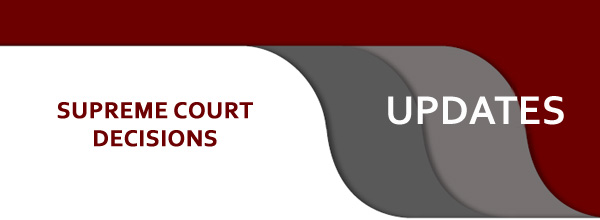
The window period from December 10, 2003 to October 6, 2010 on the exception to the 120+30 day period on claiming VAT refund applies even if the taxpayer did not actually invoke BIR Ruling No. DA-489-03.
The 120+30-day period is generally mandatory and jurisdictional from the effectivity of the Tax Code on 1 January 1998, up to the present. By way of an exception, judicial claims filed during the window period from 10 December 2003 to 6 October 2010, need not wait for the exhaustion of the 120-day period. The exception in San Roque has been applied consistently in numerous decisions of the Supreme Court.
In San Roque, the claims filed by the taxpayer were well within the window period. The written application for tax refund/credit was filed with the CIR on March 23, 2010. When it was left unacted upon by the CIR, 98 days later or on June 29, 2010, the taxpayer filed a judicial claim with the CTA Second Division. Similar to the Taganito and the 2018 San Roque cases, even if Harte-Hanks Philippines (HHP) seemed to have prematurely filed its judicial claim under the general rule, the Court, pursuant to BIR Ruling No. DA-489-03, considers HHP to have filed its judicial claim on time.
Although HHP did not actually invoke BIR Ruling No. DA-489-03 in any of its pleadings to justify the timeliness of its judicial claim with the CTA, the BIR Ruling applies to all taxpayers who filed their judicial claims within the window period of December 10, 2003 to October 6, 2010. To limit the application of the BIR Ruling only to those who invoked it specifically would unduly strain the pronouncements in San Roque, Taganito and Philex. (Harte-Hanks Philippines, Inc. v. Commissioner of Internal Revenue, G.R. No. 205189, [March 7, 2022])
The exemption given under Section 32(B)(7)(a) cannot be stretched to Title V on Other Percentage Taxes.
The taxpayer is a non-resident foreign limited partnership. Claiming exemption from stock transaction tax for the shares it traded in the Philippine Stock Exchange, the taxpayer filed a claim for refund. The CTA in Division granted the claim, citing Section 32(B)(7)(a) of the Tax Code, which provides for exclusions from gross income on income derived by a foreign government. The CTA En Banc, however, ruled that the taxpayer is not exempt from stock transaction tax since Section 32(B) of the Tax Code, as amended, merely excludes any income derived from the items enumerated therein from gross income and exempts the same from taxation only under Title II of the same law, adding that stock transaction tax is provided in Title V of the Tax Code on Other Percentage Taxes.
The Supreme Court affirmed the CTA En Banc, ruling that the exemption given under Section 32(B)(7)(a) is applicable only to income tax under Title II of the Tax Code. Its application cannot be stretched to Title V on Other Percentage Taxes. Further, it is an oft-repeated rule that tax refunds or credits – just like tax exemptions – are strictly construed against taxpayers, the latter having the burden to prove strict compliance with the conditions for the grant of the tax refund or credit. This, the taxpayer failed to do. (IFC Capitalization (Equity) Fund, L.P. v. Commissioner of Internal Revenue, G.R. No. 256973, November 15, 2021)
The CIR is authorized to distribute, apportion, or allocate gross income or deductions if they determine that such distribution, apportionment, or allocation: (a) is necessary in order to prevent evasion of taxes; or (b) clearly to reflect the income of organizations, trades, or businesses.
The DOF issued RR 4-2011 prescribing the rules on the proper allocation of costs and expenses amongst income earnings of banks and other financial institutions for income tax reporting purposes. The RR provides that a bank may deduct only those costs and expenses attributable to the operations of its Regular Banking Units (RBU) to arrive at the taxable income of the RBU subject to regular income tax. Any cost or expense related to or incurred for the operations of its Foreign Currency Deposit Units (FCDU)/Expanded Foreign Currency (EFCDU) or Offshore Banking Unit (OBU) are not allowed as a deduction from the RBU's taxable income. Under the RR, all costs and expenses should be allocated between the RBU and FCDU/EFCDU or OBU.
In declaring the RR void, the Court ruled that it unduly expands Section 50 and contravenes Section 43 of the NIRC. Under Section 50, the CIR is authorized to distribute, apportion, or allocate gross income or deductions if they determine that such distribution, apportionment, or allocation: (a) is necessary in order to prevent evasion of taxes; or (b) clearly to reflect the income of organizations, trades, or businesses. However, the allocation rules under RR 4-2011 are arbitrary and indiscriminate imposition of a uniform accounting method as it dictates the amount that banks may reflect as deductions and taxable income. Section 43 unequivocally states that taxpayers are allowed to self-determine the most applicable accounting method. The CIR may only prescribe an accounting method if any of the following conditions exist: (a) no accounting method has been employed by the taxpayer; or (b) while an·accounting method has been employed, it does not clearly reflect the income of the taxpayer. In this case, there is no showing that such conditions exist.
Indeed, Section 50 authorizes the CIR to distribute, apportion or allocate gross income or deductions between or among two or more organizations, trades or businesses owned or controlled directly or indirectly by the same interests, if he determines that such distribution, apportionment or allocation is necessary in order to clearly reflect the income of such organization, trade or business. Thus, the Commissioner is authorized to make transfer pricing adjustments. However, Section 50 is limited only to allocating expense deductions between two or more organizations, trades, or business. The subject regulation provides for an allocation method for different units or income streams within one bank or financial institution. The FCDU/EFCDU and RBU are part of a single bank or financial institution. It is hence evident that Section 50 cannot be invoked as a statutory basis for RR 4-2011 to require the allocation of costs and expenses among different units or income streams within a bank or single business unit thereof. Consequently, RR 4-2011 is declared null and void. (Department of Finance v. Asia United Bank, G.R. Nos. 240163 & 240168-69, December 1, 2021)

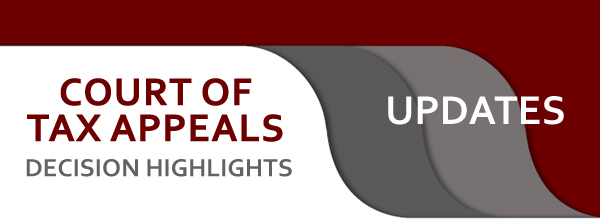
If the provider and recipient of the 'other services' are both doing business in the Philippines, the payment of foreign currency is irrelevant.
In its Motion for Reconsideration, the taxpayer insists that it is entitled to refund its unutilized input VAT attributable to its zero-rated sales of service because the main consideration is the legitimate use of foreign currency in the transaction.
The Court of Tax Appeals denied the Motion for Reconsideration, ruling that to use foreign currency as the main consideration in determining whether a person engaged in business conducted outside the Philippines is a dangerous precedent as explained in the Burmeister case: if the provider and recipient of the 'other services' are both doing business in the Philippines, the payment of foreign currency is irrelevant. Otherwise, those subject to the regular VAT under Section 102(a) can avoid paying the VAT by simply stipulating payment in foreign currency inwardly remitted by the recipient of services. (Amadeus Marketing Philippines, Inc. v. Commissioner of Internal Revenue, CTA Case No. 10094, April 4, 2022)
The prescriptive periods under Sections 203 and 222 of the Tax Code, as amended, do not apply to the issuance of an LOA.
On December 13, 2017, the taxpayer was issued a LOA covering the taxable year 2012. In its Petition for Prohibition and Injunction before the CTA in Division, the taxpayer alleges that the LOA is null and void ab initio for having been issued beyond the three (3)-year prescriptive period under Secs. 203 and 222 of the Tax Code. The CTA in Division held the LOA to be valid.
In denying the taxpayer’s Petition for Review, the CTA En Banc ruled that what is being contemplated in Secs. 203 and 222 is the issuance of a tax assessment or the filing of an action in court without an assessment for the collection of taxes, and not the issuance of a LOA. A LOA, which merely gives notice to the taxpayer that it is under investigation for possible deficiency tax assessment, is distinct and separate from an assessment, where the tax liability of the taxpayer is definitely determined. Further, in Commissioner of Internal Revenue v. Transitions Optical Philippines, lnc., the Supreme Court clarified what is required to be issued within the three (3)-year or extended period under Sections 203 and 222 of the Tax Code, as amended, is the FAN. Accordingly, there is no merit in taxpayer’s contention that the prescriptive periods under Sections 203 and 222 of the Tax Code, as amended, refer to the issuance of an LOA. (Hemisphere - Leo Burnett, Inc. v. Commissioner of Internal Revenue, CTA EB No. 2371 [CTA Case No. 9749], April 11, 2022)
Reciprocity in tax exemption means that the international air carrier's country of registry also exempts from similar taxes the gross revenue by Philippine carriers in their country.
The CIR alleges that there must be proof of actual enjoyment by Philippine carriers of income tax exemption in Bahrain based on Section 4.2 (B) of RR No. 15-2013, the implementing regulation of RA No. 10378, which states that reciprocity requires that the Philippine carriers operating in the Home Country of an international carrier are actually enjoying the income tax exemption.
A plain reading of RA No. 10378 shows that for purposes of availing the exemption from income tax under the rule on reciprocity, it is sufficient that the international carrier's home country grants an income tax exemption to Philippine carriers. The clear legislative intent is that, "for an international carrier to be excused from imposition of Philippine IT on its GPB, Section 28 (A) (3) (a) of the Tax Code, as amended by RA No. 10378 decrees that the IT law of the international carrier's home country exempts carriers of Philippine origin from such country's income taxes." This is the sole requirement. There are no other conditions.
In view of the foregoing, said provision in the regulation must be invalidated. In case of discrepancy between the basic law and a regulation issued to implement said law, the basic law prevails, because the said rule or regulation cannot go beyond the terms and provisions of the basic law. (Commissioner of Internal Revenue v. Gulf Air Company Philippine Branch, C.T.A. EB Case No. 2439 (C.T.A. Case No. 9334), [April 12, 2022])
LOA No. eLA201200033171 dated October 26, 2016 is not valid. The resulting VAT assessment is void, since the RO authorized to conduct the audit exceeded his authority.
That the LOA should cover only one (1) taxable year has been the consistent and general policy of the BIR.
In this case, LOA No. eLA201200033171 dated October 26, 2016 covers the period from April 1, 2015 to March 31, 2016. Because the taxpayer’s taxable year follows the calendar year, i.e., from January 1 to December 31, 2015, the subject LOA covers fractions of two taxable years, i.e. from April 1 to December 31, 2015 and January 1 to March 31, 2016 in violation of CIR's guidelines as well as jurisprudence on the matter. The LOA is therefore void.
(Sofgen Holdings Limited- Philippine Branch vs. Commissioner of Internal Revenue, et. Al., CTA Case Nos. 9691, April 20, 2022)
If the Commissioner of Customs fails to render the decision within the 30-day, the action of the Collector is affirmed by the former. Thus, the aggrieved party has 30 days from the lapse of such period to file an appeal before this Court.
In a Motion for Reconsideration, taxpayer avers that the CTA has jurisdiction over its case because it pertains to illegal and unlawful assessment and collection of customs duties which is paid under protest.
The CTA resolved to dismiss the Motion. Citing the Customs Modernization and Tariff Act, Customs Administrative Order No. 02-2020, and Section 11 of RA No. 1125, as amended by RA No. 9282, it ruled that any question on the action of the Collector of the Bureau of Customs (BOC) as to the valuation or assessment and collection of custom duties, the aggrieved party may file a protest before the COC within fifteen (15) days from payment of such. Similarly, the COC has thirty (30) days from receipt of said protest to act or render a decision thereon. However, if the COC fails to render the decision within that period, the action of the Collector is affirmed by the former. Thus, the aggrieved party has 30 days from the lapse of such period to file an appeal before this Court. Here, the taxpayer filed its petition for review only beyond the prescriptive period rendering the Court without jurisdiction over the instant petition. (Goldmine Rice Marketing, represented by its Proprietor/General Manager, Mr. Rolando Manuntag vs. Hon. District Collector of Customs, et. al, CTA Case No. 10559, April 21, 2022)
The statement "the records of this case disclosed that you have not introduced any evidence to overthrow the validity of the said finding" in the FLD does not satisfy the statutory requirement of stating the facts and the law on which the assessment is based.
In a motion for reconsideration, the CIR claims that the Court erred when it canceled the FLD on the ground that the same is void and without legal significance for CIR’s wanton disregard of the due process requirements. The CIR contends that the Details of Discrepancies attached to the PAN (including the computation sheet) and FLD, however simple, would clearly show the factual and legal bases of the assessment. That nowhere in the Tax Code, as amended, as well as the implementing rules and jurisprudence, requires the BIR to provide a highly detailed assessment and to refute each and every issue raised by the taxpayer.
The Court of Tax Appeals sustained its ruling that the CIR violated the taxpayer’s right to due process for his failure to state in the FLD and the FDDA, the reasons for the rejection of the taxpayer’s arguments in its Reply to the PAN and Request for Reinvestigation, respectively. To emphasize, Section 228 of the Tax Code, as amended, and RR No. 12-99, as amended, mandate that the assessments (PAN, FLD, and FDDA) should state the facts and the law on which such assessments are based; otherwise, they shall be void. The statement "the records of this case disclosed that you have not introduced any evidence to overthrow the validity of the said finding" in the FLD does not satisfy the statutory requirement of stating the facts and the law on which the assessment is based. As noted in the assailed Decision, the CIR did not even refer to the Reply to the PAN or addressed the taxpayer’s arguments therein. (Bac-Man Geothermal, Inc. vs. Commissioner of Internal Revenue, CTA Case No. 9782, April 29, 2022)

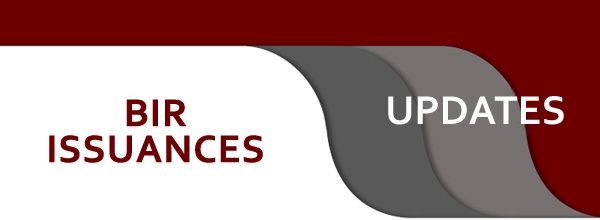
RR No. 2-2022, April 4, 2022
This prescribes the Additional Guidelines for Implementing Provisions of the PERA Act of 2008 Amending Pertinent Provisions of RR No. 17-2011 and Revising the Provisions of RR 6-2021.
This issuance is promulgated to prescribe the additional guidelines for the tax provisions of Republic Act No. 9505, otherwise known as the “Personal Equity and Retirement Account (PERA) Act of 2008” effectively amending the pertinent provisions of RR No. 17-2011 and revising RR No. 6-2021.
Submission of reports by PERA Administrators through PERASys administered by the BSP and forwarded to the BIR, for approval of the PERA Processing Office, through ePERA system:
| Name of Report | Due Date of Submission | |
| 1 | Quarterly Report on PERA Contributions | Not later than the 15th day following the close of every quarter |
| 2 | Quarterly Report on PERA Distributions/Early Withdrawals/Terminations | Within 60 days following the end of the quarter of the date of termination or withdrawal |
| 3 | Annual Report on PERA Contributions | Within 60 days from the close of the calendar year |
| 4 | Annual Report on PERA Distributions/Early Withdrawals/Terminations | Within 60 days from the close of the calendar year |
Application and Issuance of PERA TCC
The PERA-TCC refers to the documents evidencing the amount of tax credit equivalent of 5% of the total amount of qualified PERA contributions made in a year.
Application for PERA-TCC shall be filed online thru the PERASys by the PERA Administrator within 60 days from the close of the calendar year which shall be processed by the PERA-Processing Office and recommended for issuance of the corresponding PERA-TCC. Once approved, the PERA-TCC shall be generated through the facilities of the ePERA System.
Utilization of PERA-TCC
The PERA-TCC shall be used only for the payment of income tax liabilities of qualified employees and self-employed contributors, while for qualified overseas Filipino contributors, the PERA-TCC can be used in the payment of any internal revenue taxes.
RR No. 3-2022,
April 8, 2022
This prescribes the guidelines for Implementing Provisions of Republic Act (RA) No. 11635, entitled "An Act Amending Section 27 (B) of the National Internal Revenue Code of 1997, as Amended, and for Other Purposes" on the Income Taxation of Proprietary Educational Institutions and Hospitals Which Are Non-Profit.
INCOME TAXATION OF PROPRIETARY EDUCATIONAL INSTITUTIONS
AND HOSPITALS WHICH ARE NON-PROFIT
Tax Treatment
A. Preferential Corporate Income Tax Rate
| CONDITION | PREFERENTIAL CORPORATE INCOME TAX RATE | ||
| Before July 1, 2020 | July 1, 2020 - June 30, 2023 | After June 30, 2023 | |
| If gross income from unrelated trade, business or other activity, does not exceed fifty percent (50%) of the total gross income they derived from all sources. |
10% |
1% |
10% |
The above preferential tax treatment shall cover:
- Proprietary Educational Institutions;
- Hospitals which are non-profit; and
- Non-Stock, Non-Profit Educational Institutions whose net income or assets accrue/inure to or benefit any member or specific person.
B. Regular Corporate Income Tax Rate
| CONDITION | REGULAR CORPORATE INCOME TAX RATE |
| If gross income from unrelated trade, business or other activity, exceeds fifty percent (50%) of the total gross income they derived from all sources. |
25% |
| If revenues or assets are not used actually, directly, and exclusively for educational purposes. |
25% |
RMO No. 24-2022, March 4, 2022
This provides for the Dropping of the Alphanumeric Tax Code (ATC) for Revenue Source under RA No. 9505, otherwise known as PERA Act of 2008.
This issuance facilitates the proper identification and monitoring of remittances for Final Income Taxes withheld pursuant to the implementation of RA No. 9505 and due to the latest development on the proper classification of the nature of penalty on early withdrawal under ePERA, the following ATC is hereby dropped:
| ATC | Description | Tax Rate | Legal Basis | BIR Form No. |
| WI730 | Total income earned from the time of its opening to its withdrawal under the PERA Act of 2008 | 20% | RA No. 9505/ RR No. 6-2021 |
1601-FQ |
RMO 26-2022, April 29, 2022
This prescribes the guidelines and procedures in the application for revalidation of Tax Credit Certificates (TCC).
The following are the documentary requirements to be submitted to the BIR for the processing of TCC Revalidation:
1. Letter request for revalidation of TCC of the taxpayer;
2. Original copy of the TCC for revalidation
3. Original copy of the Secretary’s Certificate or Board Resolution appointing the company’s authorized signatory/ies and representative/s;
4. Authorization letter of the employee/representative duly signed by the company signatory to follow up the status of the application and to pick-up the new TCC; and
5. Photocopy of two (2) valid government-issued identification cards (IDs), and the company IDs of both the company signatory and its authorized employee/representative, if applicable.
PROCEDURE FOR FILING:
- Where: Miscellaneous Operations Monitoring Division (MOMD) under the Collective Service at the National Office
- When: Before the expiration of the validity period of the original TCC
EFFECTIVITY:
- Duration: The revalidated TCC shall be valid for a period of 5 years from the date of its issue. Issued TCCs that remain unutilized by the taxpayer after five (5) years from the date of issue, unless an application for revalidation has been filed by the taxpayer before the end of the fifth year, shall be considered invalid. It shall not be allowed for use as payment of any of the taxpayer’s internal revenue tax liability, and the unutilized amount covered by the Certificate shall revert to the general fund of the government.
RMC No. 36-2022, April 6, 2022
This provides for the Uniform Template for VAT Zero Percent (0%) Certification to be Issued by the Investment Promotion Agencies (IPAs) in relation to Q&A No. 34 of RMC No. 24-2022.
This issuance prescribes the format of VAT 0% Certification issued by the IPAs to the duly registered export enterprises (REEs).
Q & A No. 34 of RMC No. 24-2022 provides that the concerned IPA shall issue annually a VAT 0% certification to REEs which shall indicate the following:
i. Registered export activity (i.e. manufacturing, IT BPO, etc.);
ii. Tax incentives entitlement under agreed terms and conditions with validity period; and
iii. The applicable goods and services (or category thereof), i.e. raw materials, supplies, equipment, goods, packaging materials, and services, including provision of basic infrastructure, utilities and maintenance, repair and overhaul of equipment, and other expenditures directly attributable to the registered project of activity without which the registered project or activity cannot be carried out.
The following formats are attached in RMC No. 36-2022:
| Templates | Issued to REEs |
|
Template 1 |
Registered under RA No. 11534, otherwise known as CREATE Act. |
|
Template 2 |
Registered prior to CREATE. |
All IPAs shall be required to provide the BIR with a master list of all REEs which have been issued VAT 0% Certification, for counterchecking purposes.
RMC No. 37-2022 April 6, 2022
This provides for Clarificatory Guidelines on the Submission of Certificate of Entitlement to Tax Incentives Pursuant to RMC No. 28-2022.
This issuance clarifies the submission of Certificate of Entitlement to Tax Incentives (CETI) as stated in the RMC No. 28-2022.
The following enterprises shall apply for a CETI within their respective Investment Promotion Agency (IPA) through the Fiscal Incentives Registration and Monitoring System (FIRMS) prior to the filing of Annual Income Tax Return (AITR):
1. All registered business enterprises (RBEs) enjoying tax incentives under the transitory provisions of the CREATE Act; and
2. All business enterprises registered under CREATE.
RBEs already issued with a CETI in a template/format previously prescribed by the IPA shall be allowed to attach the same in their AITR for the taxable year 2021, in lieu of the Fiscal Incentives Review Board (FIRB)-prescribed CETI.
RMC No. 38-2022, April 6, 2022
This provides for Clarifications on the Transitory Provision for the Non-Income Related Tax Incentives Granted to Registered Export Enterprises under Investment Promotion Agencies (IPAs).
This issuance clarifies the transitory provision for the non-income related tax incentives pursuant to Section 5, Rule 18 of the amended IRR in relation to Section 311 of Title XIII of CREATE Act.
All existing registered export enterprises (REEs) prior to CREATE that will continue to avail of their existing income tax incentives, may continue to enjoy the VAT zero-rating on local purchases that are directly and exclusively used in the registered project or activity until the expiration of the transitory period, as follows:
| REEs | Period of Validity of VAT zero-rating |
| Granted only an Income Tax Holiday (ITH) | Until the remaining period of the ITH |
| Granted an ITH and/or 5% tax on gross income earned | Until the expiration of the 10-year limit |
If the income tax incentive of REE has already expired prior to CREATE then, the VAT zero-rating on local purchases could no longer be availed.
RMC 42-2022, April 21, 2021
This provides for clarification on the deadline for filing Annual Income Tax Returns (AITR) for Taxable Year 2021 and Guidelines in the Manner of Filing and Payment; and Non-imposition of Surcharge on Amended Returns.
This issuance is issued to reiterate the deadline for the filing of AITR for Calendar Year 2021 as well as payment of the corresponding taxes due thereon is on April 18, 22 (Monday), since April 15, 2022 falls on a non-working holiday. Also, it is issued to provide clarifications on the manner of filing and payment for taxpayers who are mandated to use eBIRForms/Electronic Filing and Payment System (eFPS) under existing issuances.
Further, the return may be amended on or before May 16, 2022, without the imposition of interest, surcharge, and penalties. Provided that, a taxpayer whose amended returns will result in overpayment of taxes paid can opt to carry over the overpaid tax as credit against the tax due for the same tax type in the succeeding period or file for refund.
FILING FOR CALENDAR YEAR 2021 AITR
| Mode of Filing | How to file |
| eBIRForms |
For taxpayers required to use or voluntarily opt to use the EBIRForms, For non-eFPS taxpayers, “No payment” CY2021 AITR shall be filed electronically through eBIRForms System. |
| eFPS |
For taxpayers required to use or voluntarily opt to enroll in the eFPS Facility, file the return electronically. For newly created returns not yet available in the eFPS Facility but available in eBIRForms, file the return thru the eBIRForms System |
| Manual Filing |
Using the electronic or computer-generated returns or photocopied returns in its original format and in Legal/Folio-sized bond paper, the following taxpayers may manually file their “No Payment CY 2021 AITR”: 1. Senior Citizen or Persons with Disabilities; |
RMC No. 43-2022, April 12, 2022
This prescribes the non-imposition of surcharge on amended tax returns.
In RMC No. 54-2018 when an additional tax is due per amended tax return, the 25% surcharge shall be imposed based on the additional tax to be paid, while in RMC 46-99 it is stated that no 25% surcharge shall be imposed in computing for the deficiency tax assessment as a result of a tax audit.
For a better understanding and reconcile the above RMCs, a 25% surcharge shall not be imposed on an amendment of a tax return if the taxpayer was able to file the initial tax return on or before the prescribed due date for its filing. On the other hand, the 25% surcharge shall be imposed on a tax deficiency found during audit if the particular tax return being audited was found to have been filed beyond the prescribed period or due date.
RMC No. 49-2022
This provides for the Clarification on Pertinent Portion of the Q&A in RMC No. 24-2022 to Align them with the Provisions of CREATE Act and its IRR.
Q & A No. 10 is revised to clarify that not only sales to registered export enterprises and domestic market enterprises (DMEs) within Ecozones and Freeport Zones are affected by the deferment of RR No. 9-2021.
Q10: RR No. 21-2021 was issued a few months after the issuance of RR No. 15-2021, which deferred the implementation of RR No. 9-2021. There is a possibility that affected taxpayers may have declared their sales to registered export enterprises as VAT zero-rated and domestic market enterprises (“DME”) within ecozones and freeports for the period July 1, 2021 up to the effectivity of RR No. 21-2021 on December 10, 2021. What happens if these are not qualified for VAT zero-rating based on the provisions of CREATE?
A10: During the period July 1 to December 9, 2021, sale transactions that were already declared as VAT zero-rated shall remain as such. The non-retroactivity rule applies as the revocation, modification or reversal will be prejudicial to the taxpayers affected.
If the affected taxpayer had already declared its sales transactions as subject to VAT, the options laid down in Q & A No. 8 and 9 of RR 24-2022 may be followed.
Q & A No. 17 is revised to inform taxpayers that entitlements of registered non-export locators (prior to CREATE Act) or DMEs located in Ecozones and Freeport Zones differ depending on the time of their registration.
Q17: What is the treatment on the sales by registered non-export enterprises or DMEs located in Ecozones and Freeport Zones?
A17: The following rules shall apply to the DME’s sales of goods and services depending on when the seller is registered either prior to or during the effectivity of CREATE:
If registered prior to CREATE:
- If the non-export locator is under the 5% Gross Income Tax (GIT) regime – The locator is a VAT-exempt entity. Sales, whether inside the Ecozones or Freeport Zones as well as from the customs territory, are VAT-exempt only to the extent of the registered activity. VAT passed on shall form part of its cost or expenses.
- If the non-export locator is under the Income Tax Holiday (ITH) with sales to registered export enterprises – Subject to VAT at zero-rate provided that the goods and services are directly and exclusively used in the registered business project or activity.
- If the non-export locator is under the Income Tax Holiday (ITH) with sales to non-export locators or DMEs within the Ecozones, Freeport Zones and enterprises from the customs territory – Subject to VAT.
If registered during CREATE:
- The sales to registered export enterprises are subject to VAT at zero-rate provided that the goods and services are directly and exclusively used in the registered business project or activity.
- The sales to DMEs within the Ecozones, Freeport Zones and enterprises from the customs territory are subject to VAT.
Q & A No. 31 and 33 are also revised.
Q31: What is required from the existing registered export enterprises that have already completed their ITH and already under the 5% GIT or SCIT regime but remained as VAT-registered entity?
A31: The following registered export enterprises is required to change its status from a VAT-registered entity to non-VAT:
- Those whose sales are generated only from the registered activity and have shifted from ITH to 5% GIT or SCIT regime must change its status within two (2) months from the expiration of their ITH; and
- Those enjoying GIT regime but are still VAT-registered at the time CREATE Act took effect must change its status within 2 months from the effectivity of this Circular.
If the taxpayer has activities other than those registered with the IPA that are subject to VAT, it shall remain as a VAT taxpayer and shall report the sales in the VAT returns as VATable, zero-rated and/or VAT-exempt, as the case may be.
Q33: Is prior approval from the BIR needed to be secured by local suppliers of goods and/or services of registered export enterprises in order for their sales to be accorded VAT zero-rating under CREATE?
A33: Yes. VAT zero-rating on local purchases shall only apply to goods and services directly and exclusively used in the registered project or activity of the registered export enterprise upon endorsement of the concerned IPA, in addition to documentary requirements of the BIR.
Absence of prior approval may result in the disallowance of the VAT zero-rated sale of the supplier.
For sales transactions qualified for VAT zero-rating but failed to secure an approved application with the BIR, prior application may not be required until March 9, 2022, or the effectivity of this RMC, subject to the three (3) documentary requirements enumerated in Q & A No. 37 of RR No. 24-2022.

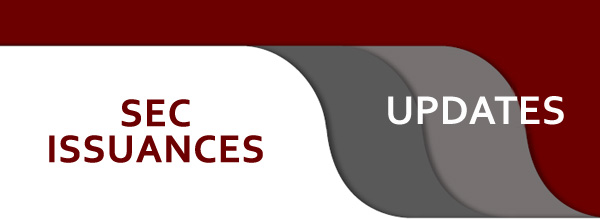
SEC OGC Opinion No. 22-01
Dated February 22, 2022
This provides for the rules on the redemption of the preferred shares.
The general rule is that treasury shares shall be deducted from the unrestricted retained earnings to arrive at the “Retained Earnings Available for Dividend Declaration”. The exception to the general rule is provided in Section 3(1) of the 1982 Rules which states that redeemed redeemable shares, although part of the treasury shares, is not subtracted from the unrestricted retained earnings to arrive at the “Retained Earning Available for Dividend Declaration.”
The exception will apply once preferred shared are redeemed, such that the amount of the retained earnings equivalent to the cost of the redeemable shares will not be restricted (i.e. non- deductibility of the cost of the treasury shares arising from such redemption from the unrestricted retained earnings), provided there are sufficient assets in the books of the corporation to cover its debts and liabilities inclusive of capital stock.

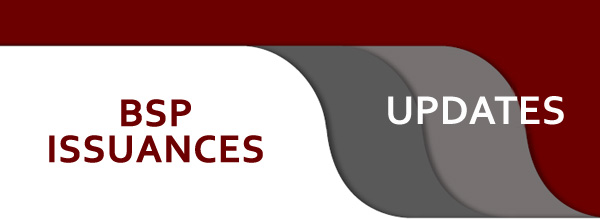
BSP Circular No. 1143, April 12, 2022
Updated Manual of Regulations for Banks and Non-Bank Financial Institutions as of 31 December 2019.
The Monetary Board has issued a Resolution approving the following amendments to the Manual of Regulations for Banks (“MORB”) and Manual of Regulations for Non-Bank Financial Institutions (“MORNBFI”) that were updated as of 31 December 2020.
The amendments include the addition of Section 8 of Circular No. 1031 dated 7 February 2019 to Section 111-S of the MORNBFI. The said provision pertains to the Processing and Licensing Fees that are applicable to NBFIs, including the Non-Stock Savings and Loans Associations
In addition, Section 324-S of the MORNBFI has been amended as well with the aim to align the provisions of Section 15 (Limitations on lending authority) item b, paragraph 2 of Republic Act No. 8367 (Revised Non-Stock Savings and Loan Association Act of 1997).
BSP Circular No. 1144, April 12, 2022
Updated Manual of Regulations for Banks and Non-Bank Financial Institutions as of 31 December 2020.
On 31 March 2022, Resolution No. 455 has been issued by the Monetary Board to approve the following amendments to the Manual of Regulations for Banks (“MORB”) and Manual of Regulations for Non-Bank Financial Institutions (“MORNBFI”) that were updated as of 31 December 2020.
In the said Resolution, Sections 217 and 246 of the MORB and Section 205-Q of the MORNBFI were amended to include a footnote reference to Memorandum No. M-2020-001 dated 30 January 2020 on the clarification on the prohibition of related entities from holding bank’s/QB’s Long-Term Negotiable Certificate of Time Deposit.
Further, Section 1151/1142-Q of the MORB/MORNBFI were also amended to add a footnote reference to some of BSP memoranda issued in 2020 covering regulatory relief measures for banks/NBFIs affected by the Coronavirus Disease 2019.

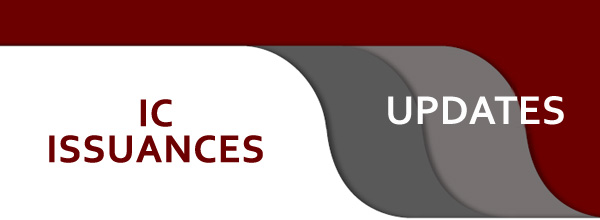
IC Circular Letter
CL-2022-20,
April 11, 2022
This amends the transitory provisions under CL No. 2020-100.
This Circular amends Section 2 of CL No. 2020-100 and includes a provision which states that for 2021, companies shall be allowed to use a discount rate not exceeding the lower of:
a. yield rate or series of yield rates that are expected to be earned from the assets of the funds that back-up the corresponding actuarial reserves over the remaining term of the contracts involved, or
b. six percent (6%) per annum in calculating the reserve liabilities for HMO products not in accordance with the products defined under CL No. 2017-19 for which the HMOs have outstanding liabilities.
All HMOs that have issued products that are not in accordance with the products defined under lC Circular Letter No. 2017-19 for which the HMOs have outstanding liabilities shall submit a quantitative impact assessment report consisting of the comparative balance sheet (statement of financial position) / income statement of the HMO, with and without regulatory relief, as of end of the applicable year, which shall be duly certified and signed by the accountant and lC-accredited HMO actuary together with CFO and shall form part of the Audited Financial Statements.
L-2022-10,
April 5, 2022
This provides for the clarification on Section 1(f) Guideline VII of the Insurance Guidelines on Rule XVI of the Omnibus Rules and Regulations Implementing Republic Act 8042.
1. Computation of amount of money claims
In the case of termination of overseas employment without just, valid or authorized cause as defined by law or contract, the migrant worker shall be entitled to their salary for the entire unexpired portion of their contract, and not merely to the lower amount between the unexpired portion of the employment contract and three (3) months for every year of the unexpired term.
However, the insurer's liability, as provided under Section 1(f) Guideline Vll of the lnsurance Guidelines, is limited to the amount set forth in the insurance contract which is only required to be at least three (3) months’ salaries for every year of the migrant worker's employment contract such salary not exceeding US$1,000.00 per month. However in case the amount of insurance coverage is insufficient to satisfy the amount adjusted or agreed upon, the recruitment or manning agency shall be liable to pay the balance thereof.
2. lnterpretation of One Thousand Dollar-Limit for Money Claims
The US$1.000.00-limit provided under Section 1(f) Guideline Vll of the lnsurance Guidelines pertains to the maximum liability of the insurance company in case of money claims arising from the foreign employer's liability, and not to the maximum monthly salary that may be set forth under the employment contract.
L-2022-12,
April 19, 2022
This confirms the application of Circular Letter No. 2017-58.
Section 290(b), Title 20 (Holding Companies) of the lnsurance Code, as amended by Republic Act No. 10607, provides that Control, including the terms controlling, controlled by and under common control with, means the possession directly or indirectly of the power to direct or cause the direction of the management and policies of a person, whether through the ownership of voting securities by a contract other than a commercial contract for goods or non-management services or otherwise. Control shall be presumed to exist if any person directly or indirectly owns, controls or holds with the power to vote forty percent (40%) or more of the voting securities of any other person.
Commission is of the opinion that the proposed transaction will not result in the acquisition of control over an HMO that would require prior approval from this Commission pursuant to the subject Circular Letter considering that the acquirer, through the Philippine holding company, will effectively own only thirty percent (30%) to thirty-six percent (36%) of the domestic HMOs.
L-2022-13,
April 26, 2022
This answers the query on Applicable interest rates in case of refusal to pay by the insurer of the loss or damage within the prescribed period.
The applicable interest rate, whether by way of legal interest in the absence of stipulation or by way compensatory interest, is uniformly pegged at six percent (6%) per annum. Consequently, under Section 249 of the lnsurance Code, as amended, the last sentence refers to the payment of interest ''...for the duration of delay” due to insurer's refusal or failure to pay the proceeds within the time allowed for, hence, such interest effectively takes in the form of a compensatory interest. With the interest rate fixed at six percent (6%), and Section 249 of the lnsurance Code, as amended, prescribes "...twice the ceiling prescribed by the Monetary Board." Therefore, the current applicable interest rate for the delay of payment of the proceeds of the policy is Twelve Percent (12%) per annum.
Central Bank Circular No. 416 sets the legal interest rate at twelve percent (12%) for the period covering 29 July 1974 up to 30 June 2013, taken together with the provisions of Section 248,249, and 250 of the lnsurance Code, as amended, the applicable interest rate then is Twenty-Four Percent (24%) per annum). On the other hand, for the period coverinq 01 Julv 2013 up to present, pursuant to the six percent (6%) legal interest prescribed by BSP Memorandum Circular No. 799, vis-a-vis Sections 248,249, and 250 of the lnsurance Code, as amended, the current applicable rate is now at Twelve Percent (12%) per annum.
Please note that the legal interest prescribed by the BSP Monetary Board is to be applied prospectively.

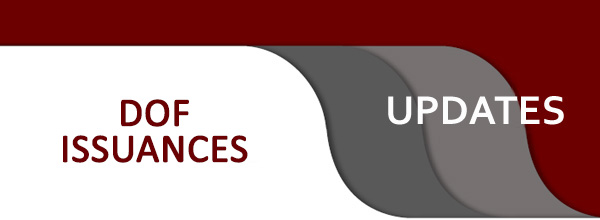
DOF Opinion No. 04.2022 - BIR ITAD No. 013-21,
April 4, 2022
The concept of an assumption is different from an exemption, the latter being the “freedom from a duty, liability or other requirement” or a “privilege given to a judgment debtor by law, allowing the debtor to retain a certain property without liability.”
The DOF ruled that Deutsche Gesellschaft für Internationale Zusammenarbeit (“GIZ”), a German government agency, is not exempt from VAT on its purchase of motor vehicles because the 2019 Exchange of Notes (“E/Ns”) between the Philippines and Germany does not provide for a tax exemption similar to the one contemplated in May 2022 E/N. The provisions in the 2019 E/Ns clearly intended a tax assumption scheme.
The DOF cited the decision of the Supreme Court (SC) in Mitsubishi Corporation – Manila Branch v. CIR, where the SC discussed the concept of tax assumption in comparison to tax exemption. In tax assumption, the obligation or liability remains, although the same is merely passed on to a different person. In this light, the concept of an assumption is different from an exemption, the latter being the “freedom from a duty, liability or other requirement” or a “privilege given to a judgment debtor by law, allowing the debtor to retain a certain property without liability.”
Moreover, the DOF ruled that GIZ cannot rely on the previous BIR ruling exempting it from payment of taxes considering that they were decided using the May 2002 E/N which was modified by subsequent E/Ns.
DOF Opinion No. 05.2022 - BIR ITAD Ruling No. 036-21,
The presence in the Philippines of the consultants of an NRFC as employee of the domestic corporation shall not be included in the determination if a permanent establishment was created during the consultancy service.
The BIR ruled that the service fees paid by SRPC, a domestic corporation to Kansai Electric Power Company, Incorporation (KEPCI), an NRFC for the provision of the latter’s consultancy services in the Philippines are subject to income tax pursuant to paragraph 1, Article 7 of the PH-Japan Tax Treaty, as amended.
KEPCI claims that SPRC employed some of the consultants after the latter’s consultancy work with KEPCI, hence, these individuals stopped being representatives of KEPCI. Their presence in the Philippines during such time should therefore not be considered for purposes of determining the period by which KEPCI rendered consultancy in the Philippines.
The DOF ruled that the service fees paid to KEPCI which are in the nature of business profits are not subject to Philippine income tax. A perusal of the Secondment Agreement vis-à-vis the OECD Commentaries would reveal that during the secondment period, the seconded individuals were considered employees of SRPC and did not represent KEPCI. Thus, it is clear that the presence of the seconded employees in the Philippines during the secondment period is due to their employees with SRPC and not of KEPCI’s. Hence, KEPCI’s provision of consultancy services to SRPC is only for a period of not more than 6 months or 180 days for 2012 to 2018 which did not result in KEPCI having created a permanent establishment in the Philippines.

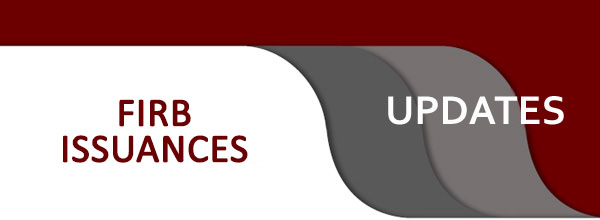
FIRB Advisory dated April 28, 2022
This provides advisory on the availability of updated Annual Tax Incentives Report (ATIR), Annual Benefits Report (ABR), Consolidated AITR, Consolidated ABR, and Master List templates in the Fiscal Incentives Review Board (FIRB) Website.
property without liability.”
This provides advisory on the availability of updated Annual Tax Incentives Report (ATIR), Annual Benefits Report (ABR), Consolidated AITR, Consolidated ABR, and Master List templates in the Fiscal Incentives Review Board (FIRB) Website.
Pursuant to CREAT ACT’s IRR, all Registered Business Enterprises (RBEs) and Other Registered Entities (OREs) availing of tax incentives shall, within 30 calendar days from the statutory deadline of filing tax returns and payment of taxes, submit to the Investment Promotion Agencies (IPAs) or Other Registered Entities (OGAs) administering tax incentives the ATIR and ABR, copy furnishing the FIRB.
| Report | Submitted by | Submitted to | Deadline |
| ATIR | RBEs and OREs availing of tax incentives | IPAs and FIRM | May 18, 2022 |
| ABR | |||
| Consolidated ATIR per IPA | IPAs and OGAs administering tax incentives | BIR and FIRB | June 17, 2022 |
| Consolidated ABR for IPA | |||
| Master List of ALL RBEs Availing Tax Incentives | IPAs | FIRB and BIR | January 30, 2022 |

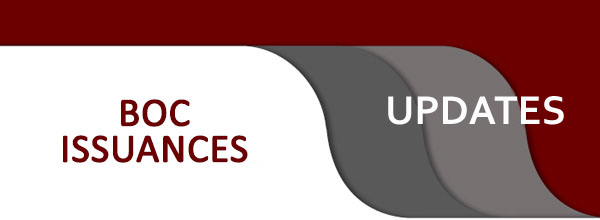
CMC No. 55-2022,
April 21, 2022
This provides the extension of transitory period and provision of interim guidelines for product registration, including labeling requirements, for household urban/hazardous substances (HUHS).
This provides the extension of transitory period and provision of interim guidelines for product registration, including labeling requirements, for household urban/hazardous substances (HUHS).
A. The 2-year transitory period extension shall start on January 1, 2022 and end on December 31, 2023.
| Authorizations | Effectivity |
| License to Operate (LTO) | Effective January 1, 2022 |
| Certificate of Product Registration (CPR) | January 1, 2024 |
| Other authorizations including Customs Clearances. Sales and Promo Permit and Certificate of Free Sale (CFS) | Not mandatory |
B. After the 2-year transitory period extension:
1. CPR shall be mandatory for all HUHS products distributed in the market.
2. Sales and Promo Permit shall be mandatory for all companies conducting promotional activities with participating HUHS products.
3. Labels of HUS products shall be fully compliant with Annex J of FDA Circular No. 2020-025, including GHS Label Elements.
4. Any requests for exhaustion of remaining stocks of non-compliant labels or HUHS products with non-compliant labels shall no longer be granted.
CMO No. 11-2022,
April 29, 2022
This provides the guidelines on the customs clearance process for all travelers and crew members using the Electronic Customs Baggage and Currency Declaration (eCBCD) System.
This provides the guidelines on the customs clearance process for all travelers and crew members using the Electronic Customs Baggage And Currency Declaration (eCBCD) system.
This order shall cover the operational procedure for the use of the eCBCD System for all travelers and crew members arriving at or departing from all ports of entry and exit.
The order provides the following guidelines:
1. General provisions
• Accomplishment of Electronic Customs Baggage Declaration Form, Electronic Currency Declaration Form if applicable and other documents required, in the eCBCD System before or upon arrival in all ports of entry.
2. Administrative Provisions
• Capacity of eCBCD System to:
o Upload documents and real-time notifications to the users on the status of their eCBCDF.
o Generate reports
• The Management Information System and Technology Group (MISTG) shall provide the technical specifications of the hardware requirements of the system of the ports concerned.
• The system administrator shall be responsible for account user creation and granting of access to:
o Assigned Customs Officers at all ports of entry and exit with International Travelers.
o AMLC
o BSP
o Other agencies, as applicable, for purposes of monitoring and report generation
3. Procedures for arriving travelers and crew members
• Fulfillment of the eCBCD System
4. Procedure for departing travelers and crew members

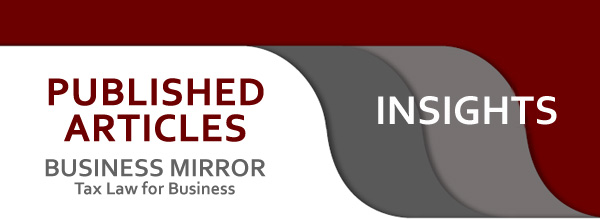
BIR’s Power to Order Closure of Business
By Atty. Rodel C. Unciano
Indeed, the Bureau of Internal Revenue (BIR) is so powerful that it can even suspend business operations and close down business establishments of non-compliant taxpayers.
Section 115 of the Tax Code does authorize the Commissioner of Internal Revenue (CIR) or his authorized representative to suspend business operations and close a business establishment of any person for failure to issue receipts or invoices, failure to file value-added tax return, understatement of taxable sales or receipts, and failure to register as required under Section 236 of the Tax Code.
As provided under Revenue Memorandum Order (RMO) 3-2009, these are the only grounds for suspension or temporary closure of business. Other infractions therefore not falling under any of the above-mentioned circumstances would not be a sufficient ground for the suspension or temporary closure of a business.
And similar with the other powers of the CIR under the Tax Code, the law requires the observance of due process in the CIR’s power to close business operations of a non-compliant taxpayer. Consistent with the due process requirement of the Constitution, the taxpayer should always be given its opportunity to explain his side of the case.
Under RMO 3-2009, a non-compliant taxpayer is defined as a taxpayer, who, as a result of surveillance/stocktaking activities, has been found to have committed the above violations, and who, notwithstanding the issuance of several notices of violations, continues to refuse to comply with the requirements provided under existing rules and regulations.
If there is a sufficient ground for the closure of the establishment, a recommendation shall be made to effect such closure. Upon the approval of the recommendation to effect the closure, the BIR shall issue to the taxpayer concerned a notice requiring him to explain under oath within forty-eight (48) hours why he should not be dealt with administratively, by suspension of business or temporary closure of his business establishment, and /or criminally, for violation of pertinent provisions of the Tax Code.
Upon the taxpayer’s submission of the explanation or failure to submit its explanation on or before the deadline, the BIR shall decide whether or not to terminate the case or to pursue administrative/criminal action against the taxpayer. If the BIR deems it necessary to pursue administrative or criminal action, it shall then cause the preparation of a 5-day VAT Compliance Notice (VCN). The taxpayer may refute the findings of the BIR and submit his response thereto within two (2) days from receipt of the VCN.
If the taxpayer refuses, neglects or fails to submit a response within the prescribed period; or submitted a response that is insufficient; or refuses, neglects or fails to comply with the terms of the 5-day VCN, a Closure Order shall then be prepared. The temporary closure of the establishment shall be for the duration of not less than five (5) days and shall be lifted only upon compliance with the requirements prescribed by the Commissioner in the closure order.
Although the Tax Code empowers the BIR to order closure of non-compliant business, its enforcement should be exercised with the highest degree of restraint as the impact of closure of business is far reaching. It should be exercised with extreme caution and under the full observance of due process of law as it will not only affect the business operations of the taxpayer under investigation but also the lives of so many people whose livelihood and business activities depend upon its operations.
Rather than killing the source of its collection, it would probably be wiser for the tax authority to proceed with the audit, cause the assessment of the taxpayer’s internal revenue tax liabilities, and collect the same, if warranted.
----------------------------------------------
For inquiries on the article, you may call or email
ATTY. RODEL C. UNCIANO
Partner
T: +63 2 8403 2001 loc. 140
This email address is being protected from spambots. You need JavaScript enabled to view it.


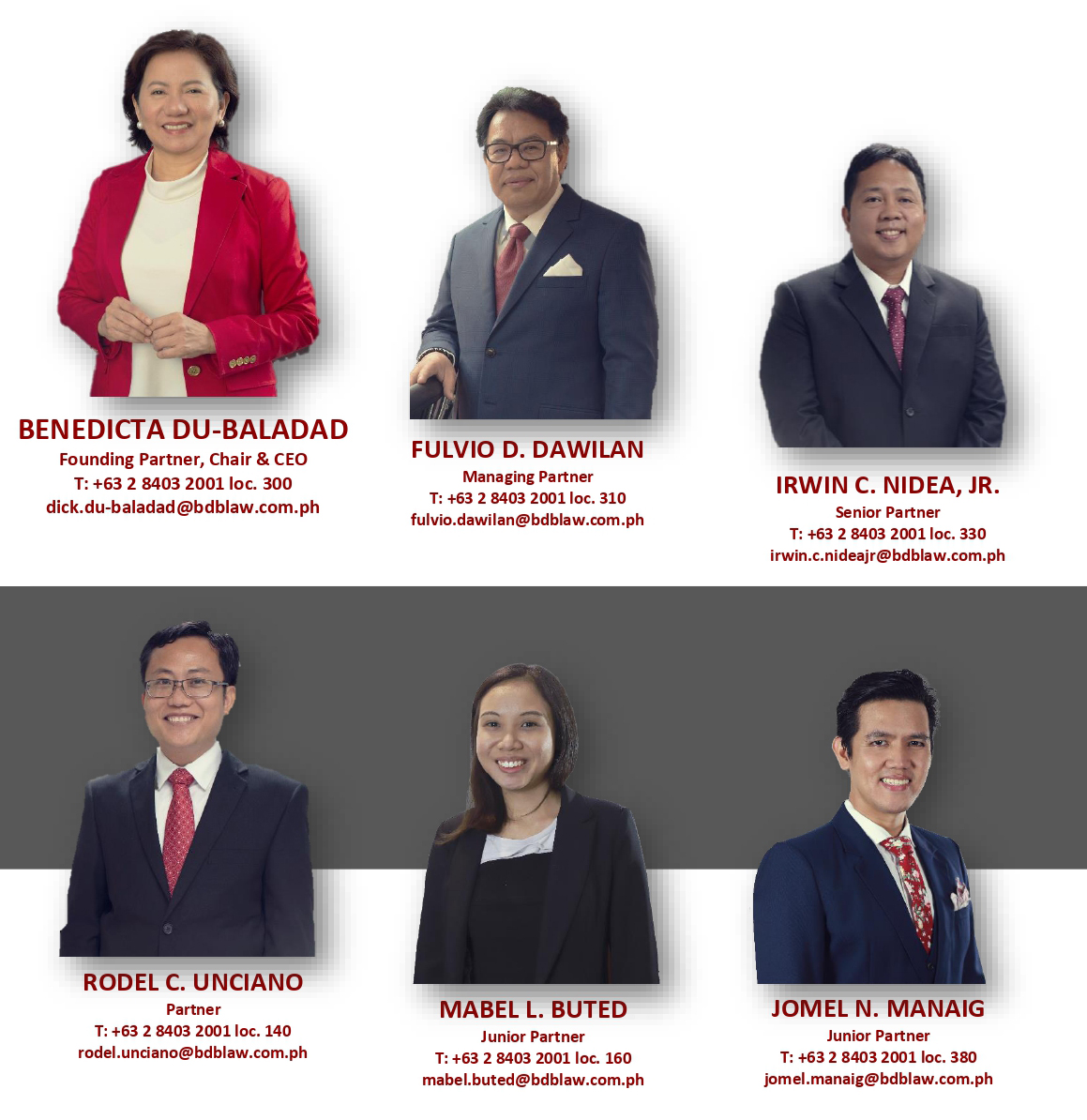
DISCLAIMER: The contents of this Insights are summaries of selected issuances from various government agencies, Court decisions and articles written by our experts. They are intended for guidance only and as such should not be regarded as a substitute for professional advice.
Copyright © 2022 by Du-Baladad and Associates (BDB Law). All rights reserved. No part of this issue covered by this copyright may be produced and/or used in any form or by any means – graphic, electronic and mechanical without the written permission of the publisher.





